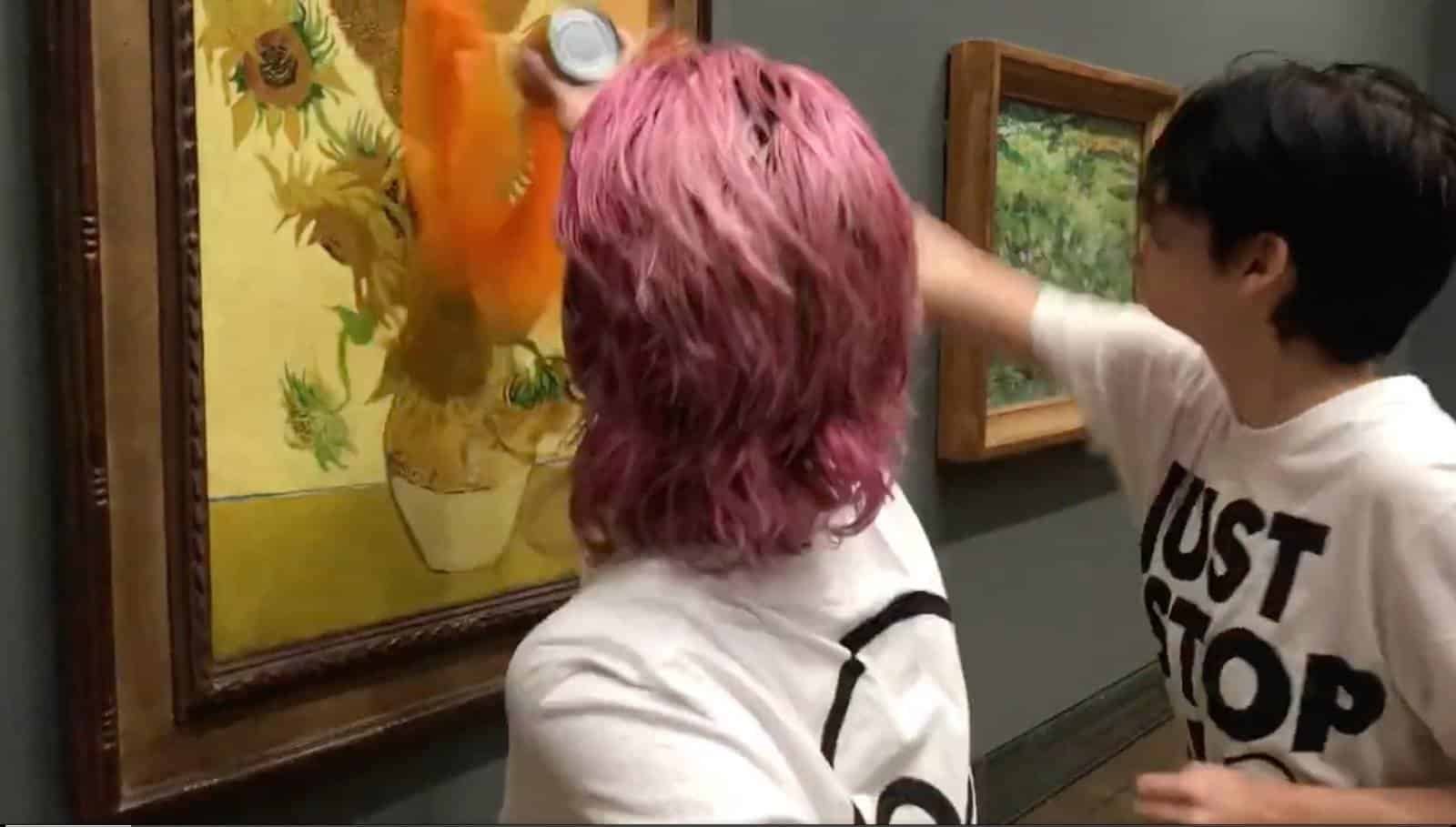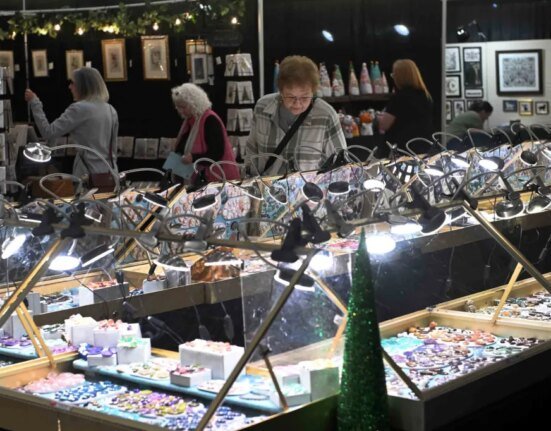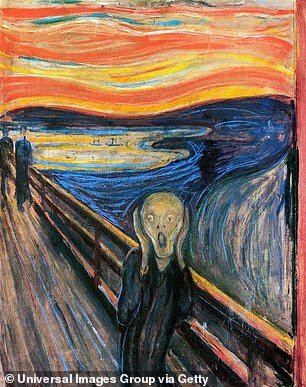Liberate Tate and Greenpeace are currently collaborating to try and make an intervention in the sentencing of the Just Stop Oil activists who threw soup at Van Gogh’s Sunflowers. The judge sentencing them on the 27th of September has threatened custodial sentences and recently sent other JSO activists to jail. Phoebe and Anna, the two activists, are both 22 years old.
Later this month, a judge will sentence Just Stop Oil (JSO) activists Phoebe Plummer and Anna Holland for criminal damage for throwing soup at Van Gogh’s Sunflowers. Judge Christopher Hehir of Southwark Crown Court told them to be “prepared in practical and emotional terms to go to prison”.
As artists, art workers and art historians, we are concerned by the courts’ defence of a false notion of artistic purity in their judgement and sentencing. Art can be and frequently is, iconoclasm. These activists should not receive custodial sentences for an act that connects entirely to the artistic canon.
Since at least 1900, avant-garde artists have called for or delivered iconoclasm as part of their artistic practice, from the Futurists and Dadaists in the early twentieth century; to Asger Jorn’s ‘modifications’ or Robert Rauschenberg erasing a drawing by De Kooning in the 1950s; to Gustav Metzger, the Gutai Group, Jim Dine, Marta Minujín and many other performance artists in the 1960s; to the rise of 1990s iconoclasts like Alexander Brenner spray-painting a Malevich painting; Jake and Dinos Chapman ‘rectifying’ rare Goya etchings; or the graffiti of Banksy and other street artists of today. The work of all these iconoclasts, often far more physically destructive than the work of JSO, is now venerated in museums around the world. Such iconoclastic works are regularly the subject of state museum exhibitions, including Tate Britain’s Histories of British Iconoclasm in 2013.
It is our expert opinion that it would be incorrect to consider this JSO action, and its social message, as an attack on an artwork from without. Instead, it belongs to the well-established tradition of creative iconoclasm illustrated above. It will inevitably enrich the story and social meaning of Sunflowers; and will be remembered, discussed and valued in itself as a creative and incisive work.
The suffragettes deployed iconoclasm to make their case: in 1914 Mary Wood struck John Singer Sargent’s portrait of Henry James three times with a meat cleaver while shouting “Votes for Women!” It was also a complaint to the Royal Academy on women artists’ representation, decades ahead of the Guerilla Girls, once iconoclastic outsiders, now exhibited globally. Certainly, Plummer and Holland’s protest might have given a nod to art history by using Campbell’s soup instead of Heinz. A year earlier, fellow JSO activists Eben Lazarus and Hannah Hunt glued themselves to Constable’s Haywain, which surely tipped a hat to Peter Kennard’s iconoclastic Haywain With Cruise Missiles.
Artist collective Liberate Tate made unsanctioned performance interventions spilling oil inside Tate galleries to end BP sponsorship. At first the reception was outrage at such iconoclasm, but as the social tide turned the group’s artworks were featured in Tate’s archive.
Crucially, Plummer and Holland knew the painting was protected from the soup by a solid pane of glass when they threw the red-orange missive, making a Pollock-esque splatter across the mustard yellow, drooping blooms. Their iconoclasm was temporary, a sight to behold to make their protest.
Vincent van Gogh painted Sunflowers just months before cutting off his own ear in self-punishment after an argument with fellow painter Paul Gaugin. On September the 27th, Judge Hehir should refrain from punishing Plummer and Holland with custodial sentences for upholding a centuries’ old tradition of calling on our social conscience through art.
Signatories
Artists
Fiona Banner
Love Ssega
Juliet Stevenson, Actor
Peter Kennard
Cat Picton-Phillipps
KennardPhillipps
Tania Bruguera
Monique Roffey, Author
Daniel Lismore
Jonathan Barnbrook
Dan Harvey, Ackroyd & Harvey
Hayley Newman
Harun Morrison
Darren Cullen, Spelling Mistakes Cost Lives
Pedro Inoue
Ricardo Dominguez
Cressida Brown, Theatre Director
As well as…
Adam Bridgland
Adele Jordan
Aidan Jolly
Alejandro Martínez
Alex Hetherington
Alex Kelly
Amanda Beardsmore
Andrea Rollefson, Not An Alternative
Andrew Simms, New Weather Institute
Andrew Smith, Revolting Artists
Angharad Bache
Anna Gillespie
Anne Caron-Delion
Anne Langfords
Beccy McCray
Beka Economopoulos, The Natural History Museum (US)
Ben Norris
Benji Bailes
Beth Stephens
Bogna Stefańska, Office for Postartistic Services
Bridget Ely
Chloe Massey
Chloe Naldrett, Sustainable Entertainment
Chrissy Kelly
Chuck Elliott
Dan Rawlings
Darren Sutton, Liberate Tate
Dave Waldman
David Cross
Doublewhy_y
Dr JC Niala
Dr. Gerard R. Rutteman, alias Drager Meurtant
Ellie Harrison
Emmer Winder
Euan Roberts
Eva Stauffer
Gaby Solly
Gaelle Vallee-Tourangeau
Guy Denning
Hannah Davey
Harry Josephine Giles
Helen Perkins
How To Catch a Pig, Bands Boycott Barclays
Imogen Knight
Isa Suarez
James Marriott, Platform
James Mernagh
Jane Lawson
Jane Morris
Jane Trowell
Jay Jordan, Laboratory of Insurrectionary Imagination
Jenny Peevers
John Churchill, Inspiral London
Kati Inskip-Codogno
Kirsten Foster
Laura Buckle
Laura Phillips
Lee Lyford
Leila Mimmack
Linda Goodacre
Lisa Remers
Liv Wynter
Lucy Bradley
Lucy Ellinson
Lucy Reeves Khan
Lynn Pilling
Malu Halasa
Mariele Neudecker
Matthew James Holman
Mel Evans
Michael Hrebeniak, New School of the Anthropocene
Michelle Tylicki
Millie Barker
Miranda Shaw
Natasha Pavey
Nicole Mollett
Nina Stevenson
Paul Burgess
Paul Skelton
Penny Southgate
Phil Barton
Rachel Gomme
Rachel Steele
Ramón Salgado-Touzón
Sarah Blowers
Sean Foley
Sheena Calvert
Simon Holliday
Sophie Austin
Sophie Holland
Stefan Szczelkun
Steffan Donnelly
Youngsook Choi
Zoe Svendsen, Metis Arts
Curators
Anna-Maria Nabirye Manyhisa, Director, Afri-Co-Lab
Anthony Roberts, Director, Colchester Arts Centre
Martine Rouleau
Marianna Dobkowska
Dr Sarah Demelo, Curator (ESCALA, Art and Special Collections), University of Essex
Stef Dickers, Special Collections Manager, The Bishopsgate Institute
Steph Warren, Gallerist, Stella Dore
Art historians and academics
Dr Gary Anderson, Head of Creative And Performing Arts, Liverpool Hope University
Dr David Cross, Reader, Camberwell, Chelsea and Wimbledon Colleges of Arts
Dr Anthony Faramelli, Lecturer in Visual Cultures, Goldsmiths
Dr Terence Flaxton, Professor of Cinematography, University of the West of England
Dr Janna Graham, Senior Lecturer in Visual Cultures, Goldsmiths
Dr Gavin Grindon, Lecturer in Cultural and Creative Industries, QMUL
Dr. Susan Kelly, Senior Lecturer Fine Art Goldsmiths
Dr Matt Lodder, Senior Lecturer in Art History and Theory, University of Essex
Dr. Steve Lyons, Research Director, The Natural History Museum
Dr Emma Mahony, Head of BA Visual Culture, National College of Art and Design, Dublin
Dr. Nadja Millner-Larsen, Experimental Humanities & Social Engagement, NYU
Dr Nicholas Mirzoeff, Professor and chair, Dept. of Media, Culture and Communication, NYU
Dr David AJ Murrieta Flores, Universidad Nacional Autónoma de México
Dr Amitabh Rai, Reader in Creative Industries and Arts Organisation, QMUL
Dr Mikkel Bolt Rasmussen, Professor in Political Aesthetics, University of Copenhagen
Dr Paula Serafini, Lecturer in Creative and Cultural Industries, QMUL
Dr Stevphen Shukaitis, Reader, Reader, EBS – Management and Marketing, University of Essex
Dr. Abigail Susik, Associate Professor of Art History, Willamette University, USA
Dr Kuba Szreder, Lecturer in Art Theory, Academy of Fine Arts, Warsaw
Sarah Temple, Course Leader Professional Studies, London College of Communication







